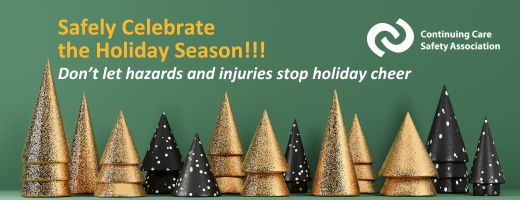Holiday Hazards
It’s the most wonderful time of the year… But it’s also the most hazardous season, especially for workers! We often see an increase in the number of injuries and accidents during this time of year. These injuries are usually caused by fire and tripping hazards, added responsibilities, fatigue, stress, decreased workforce, and burnout. Workers must be more careful as hazards tend to pile up if not controlled.

Causes of Holiday Season Workplace Injuries
There are a lot of hazards that can cause workplace accidents. Remember that our workplace is our residents’ home. Just like any other home during the holidays, we should be more vigilant in order to prevent injuries to ourselves and to more vulnerable residents. Here are a few hazards to look out for during the festive season:
- Fire Hazards
One of the great traditions of the holiday season is decorating the home and workplace with electric string lights or light-up decors. However, they do not come without risk. All employers need to make sure their decorations are safe. That means ensuring that electrical outlets are not overloaded and that lights and any other electrical decorations are unplugged or disconnected at certain times to prevent overheating.
There are some great tips from the Government of Canada regarding fire safety. Here are a few important ones to remember:
- Regularly inspect smoke alarms.
- Follow preventative maintenance schedules for your fire extinguishers.
- Always use electrical decorations, lights, and products in line with the manufacturer’s instructions.
- Do not leave candles and burners unattended. Consider substituting wax candles and liquid fuel lanterns with flameless LED battery-operated candles.
- CCSA Fire Safety Resources
- Slips, Trips and Falls
Did you know that there’s a category of holiday-related falls – injuries sustained while putting up Christmas lights? According to a study, people got seriously injured when falling off ladders or roofs while hanging lights. According to data from the Canadian Institute for Health Information, hospitalizations due to falls reached their peak in December. More than 10,000 Canadians were hospitalized after falling in December 2016.
Here are some tips and links to resources to prevent these injuries:
- Develop safe work procedures for workers to follow when using a ladder. Review procedures with staff to remind them when they hang decorations.
- Have regular preventative maintenance to icy walkways and slippery ground surfaces.
- Have the appropriate absorbent and non-slip mats and rugs with warning signs and reminders to watch their step for entryways or doorways. Ensure that any change is communicated to prevent trips.
- Alberta OHS Slips, Trips and Falls Prevention Initiative Resources
- Flu , Covid, and Other Viruses
Influenza, COVID-19, and other viruses remain threats to our health and safety during this season of giving and sharing. As workers in continuing care, we strive our best to protect the vulnerable residents we care for. Sharing joy and love this season should not include sharing viruses that can cancel our holiday celebrations.
- Hand washing is still the most effective way to prevent the spread of pathogens
- Ensure that all staff and residents have been vaccinated if possible
- Gastrointestinal Illness can also happen especially when sharing food and treats. Review this holiday food safety guide from the Government of Canada and follow the AHS Infection Prevention and Outbreak Protocols.
- Temporary Workers
Care homes and facilities also get busier during the holidays. A lot of workers are also getting sick or are on vacation this time of year. The increased activity requires employers to hire temporary or seasonal workers to keep up with the demand. Temporary workers are more likely to be involved in workplace accidents and injuries because they are inexperienced and unfamiliar with the company’s safety measures. All employers need to provide temporary workers with clear and precise safety policies and ensure they are thoroughly trained on how to operate equipment to avoid injury.
Here are some best practice resources by the National Institute for Occupational Safety and Health (NIOSH) for host employers for protecting temporary workers.
- Overexertion, Fatigue and Mental Stress
The holiday season can be a stressful time. Aside from the added responsibilities associated with the holidays, many people work overtime to keep up with production demands, meet end-of-year goals, or earn extra money to help buy gifts. This added stress leaves many workers fatigued, both physically and mentally. Fatigue is a common contributor to workplace accidents and for some, financial, emotional, and physical demands of the season can be stressful, cause anxiety, and even trigger depression.
- Here are some tips from the Canadian Centre for Occupational Health and Safety (CCOHS) to help you cope with the stress and anxieties of the season and enjoy the holiday festivities.
- Ensure staff have adequate breaks and review assigned tasks to prevent burnout
- Be clear on expectations based on worker’s roles and job descriptions.
- Other Holiday Safety Tips and Resources
Violence and Harassment
According to statistics, violence and harassment including domestic abuse, increase around the holidays, for several possible reasons -stress, alcohol, and drugs to name a few. Residents with dementia or underlying conditions may also get overstimulated or have an increased risk of mood swings due to the expectations from the holidays. Employers should include a review of their Violence and Harassment Prevention Plans around this time to prepare workers and lessen the incidence.
- Other Holiday Safety Tips and Resources
- Follow the 12 Days of Holiday Safety from Get Prepared – Government of Canada.
- Canadian Centre for Occupational Health and Safety (CCOHS) – Holiday Safety
